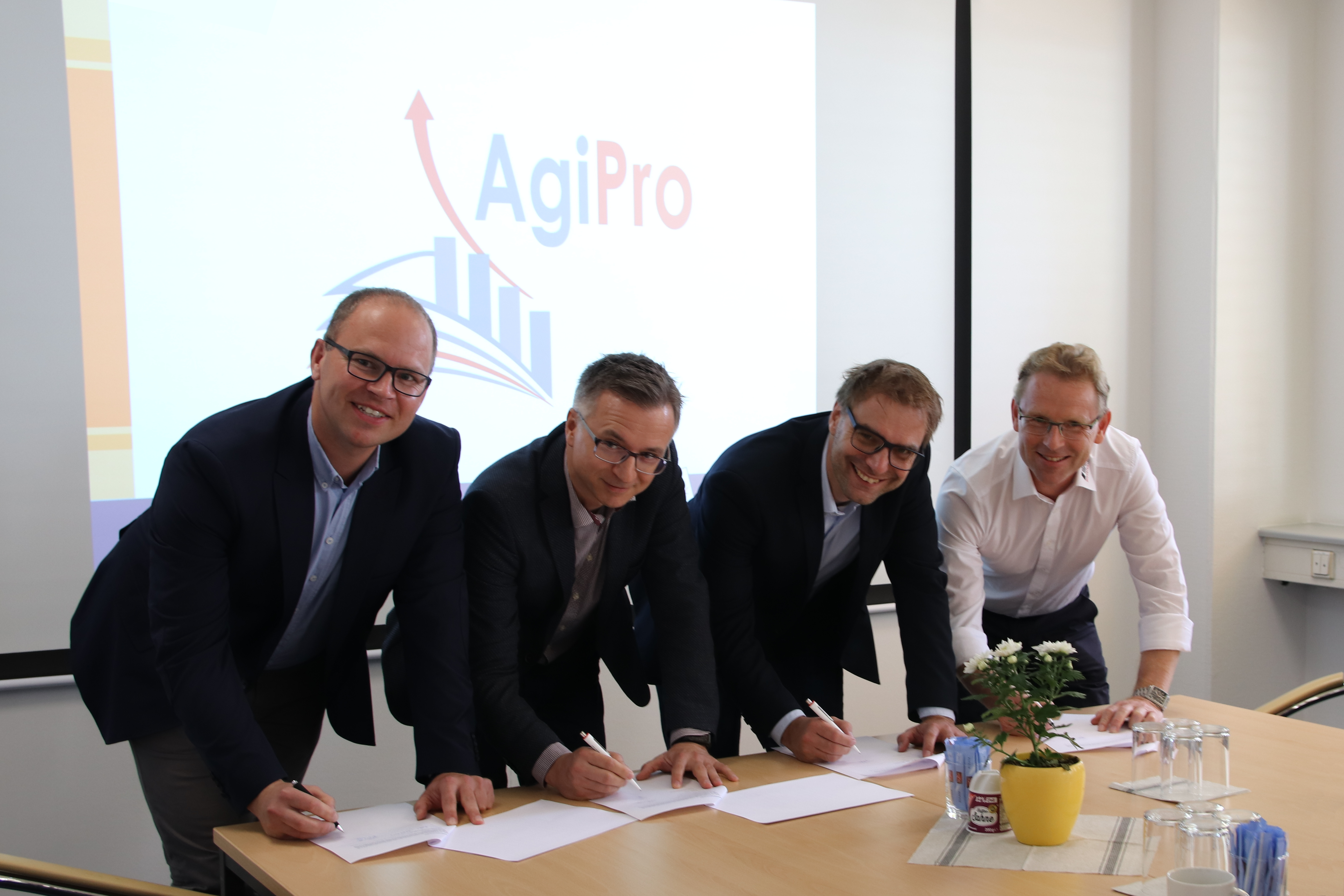Production Network Thuringia
Last week, the IWB signed a cooperation agreement in the presence of representatives of the TMWWDG, IHK, TAB, LEG, TZM and TU Ilmenau. It is a cooperation agreement with “competitors”. Why this brings us forward together, here you can find more information:
Start of the first Thuringian production network
On September 11, 2019, a production network was established in Gotha with the signing of the cooperation agreement. It combines the four manufacturing companies NOBLEX GmbH from Eisfeld, IWB Industrietechnik GmbH from Gotha, Bonsack Präzisionstechnik GmbH from Brotterode and Sczesny Werkzeugbau GmbH from Jena. In the future the enterprises want to manufacture products together. The basis for this is provided by the research project “AgiPro” of the TU Ilmenau, which is sponsored by the Thüringer Aufbaubank.
Thuringia consists to a large extent of small and medium-sized enterprises (SMEs). These are one of the strengths of the Free State, as they are flexible and, due to the typical structures in SMEs, adaptable and adaptable. Nevertheless, entrepreneurs are hesitant about accepting large orders, report the managing directors of the participating SMEs. The danger of miscalculation and the possibility of bottlenecks is too great. Working in a network offers a solution.
Network instead of platform
In the network, the companies can exchange their capacities. If a company has no capacity, but a large order, it can, for example, have part of its production done in the network. On the other hand, companies that currently have free capacity can benefit from orders from the network. But why a network of all things? Wouldn’t a platform also be a solution? That one already tried, so Roger Steiner, one of the managing directors of the NOBLEX GmbH. In so-called capacity exchanges one would have as KMU however rather small chances. It would be opaque and prices would be pushed so far that production would ultimately be uneconomical.
Different in the network. Here the companies are connected with each other, but the networking is – in contrast to static platforms – event- or demand-oriented. This requires a certain degree of transparency, the companies must know which partners have how much free capacity at any given time. How large are the machines that are currently free? How long can they be used? Thanks to digitalization, this information is available in real time. And that also makes pricing easier. Unlike platforms, the so-called “peer-to-peer” network is not about competition, but about equality and dynamic collaboration. In this way, even large orders can be processed economically by SMEs.
How does this work in practice?
Several companies have higher production capacities than a single one when it comes to short-term demand. The network thus increases a company’s own capacities by external capacities. The ups and downs that short-term planning changes cause in the resource utilization of the production areas are thus cushioned and large orders do not have to be rejected, but can be mastered together. A prerequisite for this is the most precise knowledge possible of the order situation, throughput time and inventories in the network. Process recording and monitoring are therefore the first step that the four companies are taking. Then a middleware is set up, which represents the interface between the companies. A special challenge here are the different ERP systems that are available in the participating SMEs. Digital images of machines or groups of machines existing in the company enable networking. A controller system supports the participating companies in dynamic pricing. The SMEs themselves determine which criteria they need for the exchange, which interfaces they (want to) release and what the rules for the award of contracts in the network are. This is made possible by the Berghof Group GmbH, an SME from Königsee in Thuringia. According to Steffen Berghof, managing director of the company, there is a high demand for such software solutions on the market.
The starting signal for the cooperation >/strong>
On September 11, 2019, the cooperation agreement was signed at IWB Industrietechnik GmbH in Gotha, thus laying the foundation stone for the first Thuringian production network. The agreement assures the participants that they will remain independent companies regardless of the cooperation and emphasizes the value of trustful cooperation. The network participants commit themselves to abide by the rules they have established, to qualify their employees accordingly and to deliver the services on time and in high quality.
By participating, the companies use their chance to try out the latest technologies. Data from the ERP systems will be displayed in the form of a digital shadow, allowing simulations to be carried out and used as an aid to decision-making. The middleware developed in the research project and the knowledge gained will help other companies to build similar networks in the future.
In addition to the horizontal production network, the idea of a vertical network is also in the starting blocks with “AgiLief”. A corresponding application for subsidies has already been submitted by the TU Ilmenau to the state of Thuringia.
Source: TU Ilmenau, SME 4.0 Competence Center Ilmenau, Maxim Reimche (Ilmenau, 16 September 2019)
